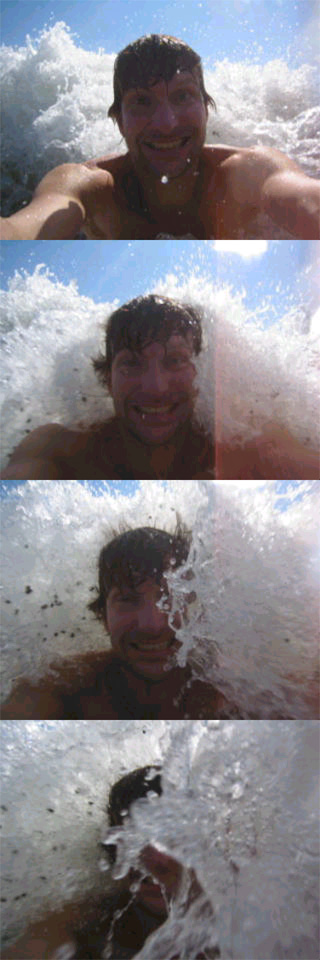 |
What we're
seeing
now in the Gulf of Mexico is a radical intensification of environmental
degradation which has been occurring incrementally for decades. Instead of
the proverbial frog being slow-boiled oblivious to its fate, it has now been
thrust into the killing water.
I grew up on Long Island where one is never more than 8 miles from a saltwater
beach:
Long
Island Sound to the north, the placid playground of
the
Gatsby set where the water tends to be colder, catching wisps of the
Labrador current from the north; the Atlantic to the south, warmed by the
tail end of the
Gulf
Stream before it spins out and tapers into the chill North Atlantic waters
off
Montauk
Point (where Great White shark attacks closed ocean beaches during my
earliest recollected family vacation in the summer of '74--I remember the
adults cautiously deciding it would be safe to swim in the bay as they sat
under moth-clouded lights on motor court porches); and where the barrier
of Fire
Island stretches its slender limbs you have formed
Great
South Bay, on whose shores I grew up in
Blue
Point, the small fishing village which gave its name to a famously delectable
oyster and where
my elementary
school mascot was a clam.
My neighbor Wayne Ramestella's mother's live-in boyfriend had his own boat
and biceps the size and shape of softballs from hauling muck hand-over-hand
to the surface using 30-foot-long poles with toothed baskets at the bottom.
But you didn't need a boat and rake to get clams--we'd just wade in at
Corey
Beach and dig 'em up with our feet, eat 'em raw with ketchup or give
them to our parents to grill or mix with stuffing then bake in their own
shells.
The 70s were a bittersweet time to be a child. One could feel the world being
diminished around them. I didn't know what to call it then, but I saw and
felt the effects of sprawl as wild spaces were tamed,
Sunrise
Highway expanded, and the fishery died out due to pollution. I don't
think I've ever quite gotten over that sense of loss. If it were an isolated
incident, maybe, but it was just a local (and not very early) symptom of
a
sickness which continues to spread ever more rapidly.
I grew up loving the beach as only the American-born child of political refugees
from a landlocked country can. There were no horizons as wide as the ocean's
in Soviet Czechoslovakia and I suspect that far blue line symbolized the
ultimate freedom to my immigrant parents. Almost all our recreations and
vacations brought us to a beach and though my
mother preferred calmer waters, from the time I was 4 I've reveled in
the ocean's furious embrace, first fighting then riding the waves.
In 1990, just turned 21, 2 friends and I hitch-hiked cross country for 3
months. In the days before the Internet, planning was a little sketchier.
In a guidebook I saw Biloxi, Mississippi advertised as having the longest
white sand beaches in the Western Hemisphere. Having grown up on Long Island's
splendid
beaches I knew I had to go see them. The beaches were long and white,
all right, if slightly soiled, but when we asked some locals why no one was
swimming they just smirked and pointed to the
oil
rigs spread out over the water to the horizon and beyond.
If any good can come of this epic tragedy it is that it will lead to the
cessation of offshore drilling and other ongoing intentional catastrophes
such as the
Tar
Sands, but the only way that will happen is if the profit is taken out
of these endeavors--which could be accomplished by heavier regulation (fees,
taxes, penalties) and consumer boycott. Locally, even before this happened,
I signed up to be
a volunteer
water quality tester here on
Puget
Sound. Training is on June 13. I'll let you know how it turns out. |

